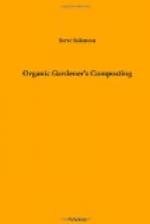Holding two conflicting goals at once is the fundamental definition of a problem. Not being willing to abandon either (or both) goals is what keeps a problem alive. Different and somewhat opposing needs of these two audiences make this book somewhat of a problem. To compensate I have positioned complex composting methods and the connections between soil fertility and plant health toward the back of the book. The first two-thirds may be more than sufficient for the larger, more casual members of my imaginary audience. But I could not entirely divide the world of composting into two completely separate levels.
Instead, I tried to write a book so interesting that readers who do not food garden will still want to read it to the end and will realize that there are profound benefits from at-home food production. These run the gamut from physical and emotional health to enhanced economic liberty. Even if it doesn’t seem to specifically apply to your recycling needs, it is my hope that you will become more interested in growing some of your own food. I believe we would have a stronger, healthier and saner country if more liberty-loving Americans would grow food gardens.
CHAPTER ONE
What Is Compost
Do you know what really happens when things rot? Have other garden books confused you with vague meanings for words like “stabilized humus?” This book won’t. Are you afraid that compost making is a nasty, unpleasant, or difficult process? It isn’t.
A compost pile is actually a fast-track method of changing crude organic materials into something resembling soil, called humus. But the word “humus” is often misunderstood, along with the words “compost,” and “organic matter.” And when fundamental ideas like these are not really defined in a person’s mind, the whole subject they are a part of may be confused. So this chapter will clarify these basics.
Compost making is a simple process. Done properly it becomes a natural part of your gardening or yard maintenance activities, as much so as mowing the lawn. And making compost does not have to take any more effort than bagging up yard waste.
Handling well-made compost is always a pleasant experience. It is easy to disregard compost’s vulgar origins because there is no similarity between the good-smelling brown or black crumbly substance dug out of a compost pile and the manure, garbage, leaves, grass clippings and other waste products from which it began.
Precisely defined, composting means ’enhancing the consumption of crude organic matter by a complex ecology of biological decomposition organisms.’ As raw organic materials are eaten and re-eaten by many, many tiny organisms from bacteria (the smallest) to earthworms (the largest), their components are gradually altered and recombined. Gardeners often use the terms organic matter, compost, and humus as interchangeable identities. But there are important differences in meaning that need to be explained.




